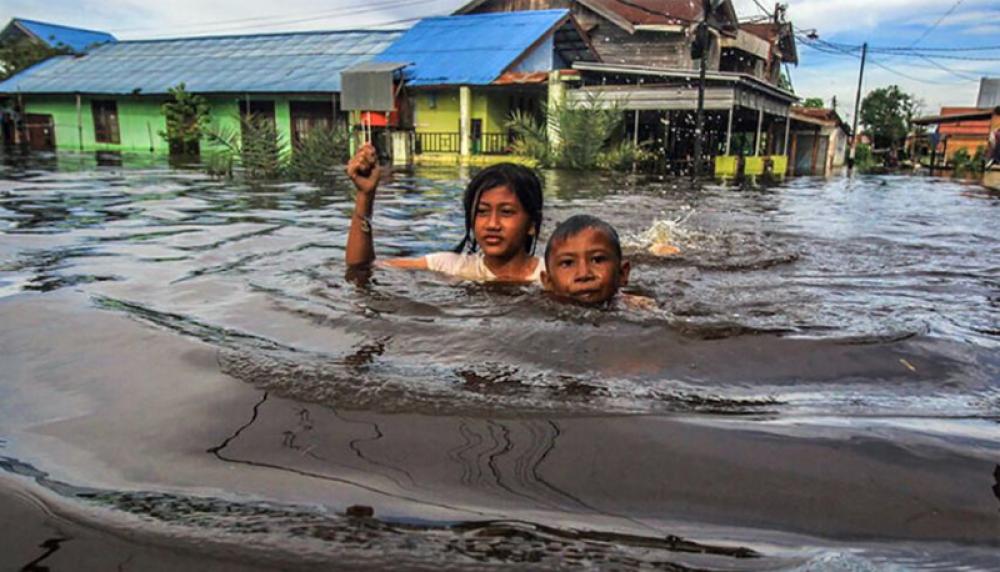Just Earth News | @justearthnews | 15 Feb 2023

Image: © Greenpeace/Pram
New York: Rising seas pose “unthinkable” risks to billions around the world, with profound implications for security, international law, human rights and the very fabric of societies, senior officials told the Security Council on Tuesday, as members held their first-ever debate on the phenomenon’s global implications.
“The impact of rising seas is already creating new sources of instability and conflict,” said UN Secretary-General António Guterres, who opened the meeting.
Noting that some nations’ coastlines have already seen triple the average rate of sea level rise, he warned that, in the coming decades, low-lying communities – and entire countries – could disappear forever.
“We would witness a mass exodus of entire populations on a biblical scale, and we would see ever-fiercer competition for fresh water, land and other resources,” he warned.
‘Threat multiplier’
Describing sea level rise as a threat multiplier, the Secretary-General said the phenomenon also jeopardizes access to water, food and healthcare.
Meanwhile, saltwater intrusion can decimate jobs and entire economies in industries like agriculture, fisheries and tourism, and it can damage or destroy vital infrastructure, such as transportation systems, hospitals and schools.
According to recently released data from the World Meteorological Organization (WMO), global average sea levels have risen faster since 1900 than over any preceding century in the last 3,000 years.
It warns that, even if global warming is “miraculously” limited to 1.5 degrees, the planet will still see a sizeable rise in sea water levels.
Devastation evident
Mr. Guterres warned the Security Council that, under any temperature rise scenario, countries from Bangladesh to China, India and the Netherlands will all be at risk.
Mega-cities on every continent will face serious impacts, including Lagos, Bangkok, Mumbai, Shanghai, London, Buenos Aires and New York.
The danger is especially acute for some 900 million people living in coastal zones at low elevations –one out of every ten people on earth.
Devastation is already evident in many parts of the world, he said, noting that rising seas have decimated livelihoods in tourism and agriculture across the Caribbean.
Sea level rise and other climate impacts are already forcing people to relocate in Fiji, Vanuatu, the Solomon Islands and elsewhere.
Against that backdrop, he called for action on several fronts, including broadening the global community’s understanding of the root causes of insecurity, and addressing the impacts of rising seas across legal and human rights frameworks.
“People’s human rights do not disappear because their homes do,” he stressed.
Threats to world’s ‘breadbaskets’
Csaba Kőrösi, the current President of the General Assembly, also addressed the Council, recalling that climate change – “the greatest challenge of our generation” – was the issue most raised by world leaders during the Assembly’s last high-level debate.
Citing projections that between 250 and 400 million people will likely need new homes in new locations in fewer than 80 years, he also warned of devastating impacts for the world’s “breadbaskets,” especially fertile deltas along the Nile, Mekong and other rivers.
Meanwhile, climate-induced sea level rise is also provoking new legal questions that are at the very core of national and State identity.
He urged the Council to recognize the significance of climate action as a key tool for peacebuilding, stressing that the data and frameworks to defend against the sea level threat already exist.
“What is needed now – as ever – is the political will to act,” he said.
Made stateless by the sea
Bogdan Aurescu, Romanian foreign minister and Co-Chair of the International Law Commission Study Group on Sea-Level Rise, agreed that climate change-related sea level poses a real risk to over two-thirds of UN Member States.
Outlining a range of sea level rise implications, he said coastlines are being “pushed” inward, affecting baselines from which countries’ maritime zones are measured and therefore threatening countries’ access to resources.
While several actions are available to protect countries’ coastlines, including physical barriers, their costs remain out of reach for many of the countries worst affected.
Mr. Aurescu emphasized the need to better harness international law to support countries most at risk from sea level rise, pointing out that the International Law Commission recently added the topic “Sea-level rise in relation to international law” to its agenda.
Among other threats, he said urgent efforts are needed to avoid possible situations of “de facto statelessness,” including by preserving the fundamental rights and identities of people forced to flee their home countries as a result of climate change.
Impunity and inaction
Also addressing the Security Council was Coral Pasisi, Director of Climate Change of the Pacific Community and President of the non-governmental organization, Tofia Niue.
She warned that, by 2050 – “within the lifetime of our children and grandchildren” – sea level rise will have exceeded at least one metre for most small island developing States, a shift that will last for thousands of years.
Listing severe impacts already facing communities today, from coral reef bleaching to salt water intrusion, she decried the international community’s continued flouting of responsibility and impunity in failing to act to stop climate change.
“This is a security issue of paramount importance to the Pacific Region,” she said, emphasizing that the security fallout of unaddressed sea level rise will fall directly under the Council’s remit.
She also expressed her hope that the General Assembly will soon adopt a resolution, put forward by Vanuatu, requesting an advisory opinion from the International Court of Justice on the obligations of States vis-á-vis climate change.